 6 citations,
July 2016 in “Gynecological Endocrinology”
6 citations,
July 2016 in “Gynecological Endocrinology” PSA levels are higher in women with PCOS, but FAI is a more accurate marker for diagnosis.
 6 citations,
January 2016 in “Evidence-based Complementary and Alternative Medicine”
6 citations,
January 2016 in “Evidence-based Complementary and Alternative Medicine” Boiling and fermenting certain herbs can help hair grow by activating hair growth genes and pathways.
 6 citations,
April 2013 in “International Journal of Dermatology”
6 citations,
April 2013 in “International Journal of Dermatology” Valproic acid helped hair growth in alopecia patient; more research needed.
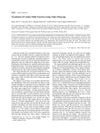 6 citations,
January 2011 in “Journal of veterinary medical science”
6 citations,
January 2011 in “Journal of veterinary medical science” Using a video otoscope effectively treated ear infections in dogs.
 5 citations,
March 2023 in “Archives of dermatological research”
5 citations,
March 2023 in “Archives of dermatological research” Increased HIF-1α is linked to the inflammation and severity of hidradenitis suppurativa, suggesting treatments that lower HIF-1α could help.
 5 citations,
June 2022 in “Frontiers in immunology”
5 citations,
June 2022 in “Frontiers in immunology” Increasing Treg cells in the skin does not cure hair loss from alopecia areata in mice.
 5 citations,
February 2022 in “Frontiers in physiology”
5 citations,
February 2022 in “Frontiers in physiology” Hair graying is influenced by factors like nerves, fat cells, and immune cells, not just hair follicles.
 5 citations,
January 2021 in “Journal of The American Academy of Dermatology”
5 citations,
January 2021 in “Journal of The American Academy of Dermatology” Low-dose oral minoxidil is an effective and safe treatment for hair loss.
 5 citations,
May 2019 in “Archives of Dermatological Research”
5 citations,
May 2019 in “Archives of Dermatological Research” Narrowband UVB treatment increases certain gene expressions in psoriasis skin and improves symptoms.
 5 citations,
March 2019 in “Experimental dermatology”
5 citations,
March 2019 in “Experimental dermatology” Activating TLR3 may help produce retinoic acid, important for tissue regeneration.
 5 citations,
April 2018 in “Journal of Dermatological Science”
5 citations,
April 2018 in “Journal of Dermatological Science” Adjusting estradiol-ANGPT2 levels can promote hair growth in female pattern hair loss.
 5 citations,
March 2014 in “Journal of The American Academy of Dermatology”
5 citations,
March 2014 in “Journal of The American Academy of Dermatology” The study suggests hormonal factors may play a role in Frontal Fibrosing Alopecia and that treatments like oral antiandrogens and steroids could be beneficial.
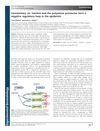 5 citations,
October 2013 in “Experimental Dermatology”
5 citations,
October 2013 in “Experimental Dermatology” The commentary explains that a balance of HR protein and putrescine is important for normal hair growth.
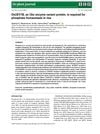 4 citations,
February 2021 in “Plant journal”
4 citations,
February 2021 in “Plant journal” OsUEV1B protein is essential for controlling phosphate levels in rice.
 4 citations,
February 2021 in “Journal of Cosmetic Dermatology”
4 citations,
February 2021 in “Journal of Cosmetic Dermatology” Pumpkin seed oil slightly outperforms minoxidil foam in treating hair loss with fewer side effects.
 4 citations,
July 2020 in “BMC Complementary Medicine and Therapies”
4 citations,
July 2020 in “BMC Complementary Medicine and Therapies” Human placenta helps hair grow back after chemotherapy by blocking cell death and increasing hair follicle growth.
 4 citations,
July 2020 in “Biochemical and Biophysical Research Communications”
4 citations,
July 2020 in “Biochemical and Biophysical Research Communications” A protein called ectodysplasin-A2 increases a hair growth inhibitor in balding cells, which could be a target for hair loss treatment.
 4 citations,
June 2019 in “International Journal of Dermatology and Venereology”
4 citations,
June 2019 in “International Journal of Dermatology and Venereology” Some skin diseases may indicate a higher risk of metabolic syndrome and related health issues.
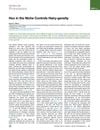 4 citations,
October 2018 in “Cell Stem Cell”
4 citations,
October 2018 in “Cell Stem Cell” Hox genes control hair growth patterns in mammals by regulating stem cell activity in the skin.
 4 citations,
October 2018 in “Asia-Pacific Journal of Clinical Oncology”
4 citations,
October 2018 in “Asia-Pacific Journal of Clinical Oncology” CDK4/6 inhibitors have improved treatment outcomes for certain advanced breast cancer patients.
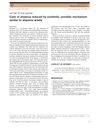 4 citations,
November 2017 in “The Journal of Dermatology”
4 citations,
November 2017 in “The Journal of Dermatology” Sorafenib may cause hair loss in a way similar to alopecia areata.
 4 citations,
March 2016 in “Dermatologic Surgery”
4 citations,
March 2016 in “Dermatologic Surgery” PRP treatment increased hair density, especially in men and younger patients with AGA.
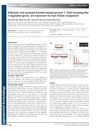 4 citations,
April 2015 in “Experimental Dermatology”
4 citations,
April 2015 in “Experimental Dermatology” Certain genes controlled by OVOL1 are crucial for creating new hair follicles.
 4 citations,
July 2012 in “Genesis”
4 citations,
July 2012 in “Genesis” The Megsin-Cre transgene is a new tool for genetic manipulation in the skin and upper digestive tract.
 4 citations,
April 2012 in “Medical Hypotheses”
4 citations,
April 2012 in “Medical Hypotheses” Finasteride may improve stem cell therapy for heart attacks by increasing cell survival.
 4 citations,
July 1994 in “Clinics in Dermatology”
4 citations,
July 1994 in “Clinics in Dermatology” Eosinophilia-myalgia syndrome, linked to contaminated L-tryptophan supplements, caused severe symptoms and some deaths, with long-term effects in survivors.
 3 citations,
June 2023 in “Frontiers in medicine”
3 citations,
June 2023 in “Frontiers in medicine” Oxidative stress may contribute to hair loss in alopecia areata and antioxidants could potentially help as a treatment.
 3 citations,
May 2023 in “Precision clinical medicine”
3 citations,
May 2023 in “Precision clinical medicine” Researchers found four genes that could help diagnose severe alopecia areata early.
 3 citations,
January 2021 in “Journal of Bioscience and Bioengineering”
3 citations,
January 2021 in “Journal of Bioscience and Bioengineering” Sweet potato shochu oil and its components may effectively promote hair growth.
 3 citations,
October 2019 in “Pharmaceutics”
3 citations,
October 2019 in “Pharmaceutics” New technique implants pigment in scalp with less pain and damage.






























